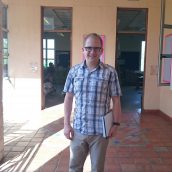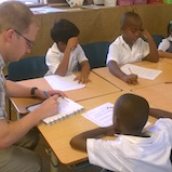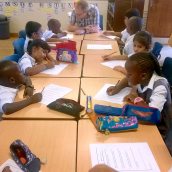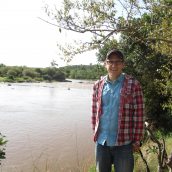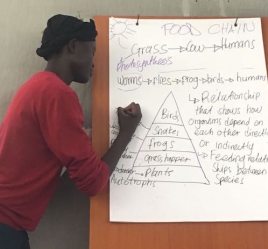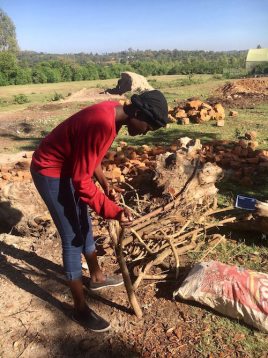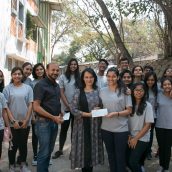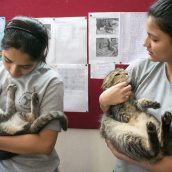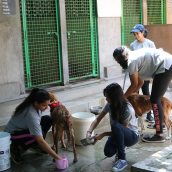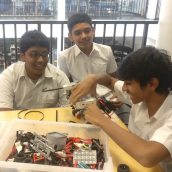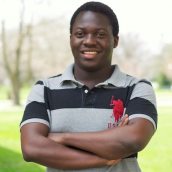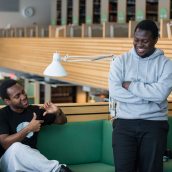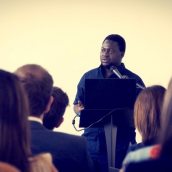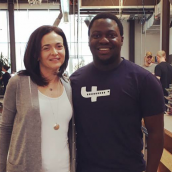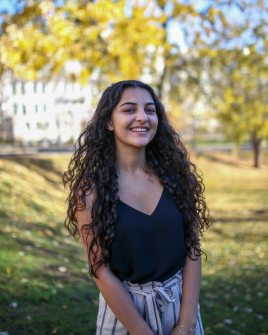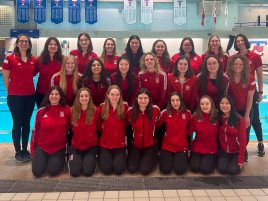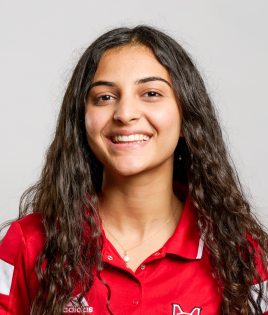Sharing practice across oceans
Andrew Jones is a teacher from Ontario, Canada who has spent the past year at the Aga Khan Academy Mombasa, working with the Junior School as part of a teacher secondment partnership between the Aga Khan Academies and the Province of Ontario.
On first arriving at the Academy Andrew said, “I [am] expecting an enriching experience that will allow me to learn about another culture by being immersed in it. I expect to grow as an educator because different settings, both culturally and through the [International Baccalaureate] programme, will allow me to expand my skill set as to how best practices support student learning.” One year later, he reflects on his experience.
Almost two years ago now, I was reading the book, Everyone Can Learn to Ride a Bicycle, by Chris Raschka to my new grade one class in Kitchener, Ontario, Canada. This book helps me encourage my students at the start of the year to continue developing resiliency through adopting a growth mindset by trying new things, taking risks and reflecting on both successes and mistakes. Little did I know, I was not just teaching my students this skill, but I was also going to follow this advice myself.
Ever since I began teaching almost 10 years ago, many changes in my job assignment have sparked a passion for professional learning and development in my teaching practice. Over this year, I have immensely enjoyed this new job working for the Ministry of Education in Ontario on an educational partnership between our government and the Aga Khan Academy Mombasa. I have had the opportunity to grow and learn as both an educator and an individual through my interactions at the Academy and through daily life in Mombasa.
Working at the Aga Khan Academy Mombasa has been an immense opportunity of both professional and personal learning that I am thankful for. I ask myself this very question, “What best teaching practices am I learning about that I should share with Ontario teachers?”
Here are three that I have learned more about since being here.
Building Confident Leaders – Students build their confidence and exude enthusiasm as they try new things and take risks during their participation in a variety of classroom activities, sports galas, enrichment opportunities and Friday assemblies. Students are confident, have strong leadership skills and advocate for equity. Confidence stands out as a defining characteristic of the learners present here in the Junior School.
Promoting Pluralistic Thinking – The Junior School’s demographic is vibrant and diverse, reflective of the Mombasa community’s cultures, religions and backgrounds. Activities at the school, such as the Arts Week performance, continually emphasise appreciation and understanding toward different views and beliefs and encourage students to think pluralistically as they work together.
Dual Language Practices – I have been learning Kiswahili “pole pole” this past year, and I am quite experienced in giving directions to tuk tuks and boda bodas. As I learn a new language, it helps me think about the world in different ways and makes me more pluralistic in my thinking. Likewise, students at the Academy develop academic competency and fluency in both the national language of Kenya, Kiswahili, and the official language of Kenya, English. Additionally, learning similar concepts in two languages allows students to develop pluralistic view points as languages sometimes look at similar ideas in different ways.
I am thankful to explore Kenya’s beauty and diversity, so far from Mount Kenya to the Masai Mara to Mombasa. I continue to grow and to learn and am thankful to the kind and generous Mombasa community that has made my transition to working at the Academy warm and welcoming. I feel very privileged to be working with such a dedicated and caring staff and with phenomenal students.
By Andrew Jones
Josephine Awino (Class of 2018): Cultivating a passion for sustainable agriculture
Josephine Awino, alumna of the Aga Khan Academy Mombasa, will be attending Wellesley College for her undergraduate studies in environmental science. She shares a reflection on her personal journey at the Academy in which she developed a sense of self and fostered her passions.
I was born in Mombasa, Kenya where my father worked as a photographer and my mother was a housewife. When I was three years old, however, my father died due to a tetanus infection. With no support from anyone in Mombasa, my mother was forced to move back home in Kisumu where the extended family was. Upon moving back, she had no job but still had to find a way to support my family as no one else would. She started farming vegetables at the family farm and sold her produce at the market and that’s how we survived for some time. At that time, farming wasn’t enough to support family needs and many times my family would go without a meal even for a whole day. Despite my mum farming food crops we still ended up having no food many times. I was enrolled at Tido Primary School where my siblings and I were fortunate to get sponsorship from an NGO who were willing to pay for our fees given our performance in class. My mother tried to carter for our uniform and food but she still wasn’t earning enough; when the NGO stopped supporting us educationally, I found myself home due to lack of fees. At that time, my mother wasn’t even able to pay for exam fees and went home without doing exams for the next grade. Coming from this background, where I hated my life and surroundings, I never stopped hoping for a better future for myself and my family. I just wanted to live like a normal child, doing normal things and not having to worry about whether I’ll have food for the next meal, or enough clothing, or if I’ll be allowed to attend class without the required fees.
Looking back at my mother who was raising five kids playing the role of both a mother and a father, I knew that she was doing the best that she could to raise and provide for us and I wanted to be able to help her in the future. I not only wanted to help her, but I didn’t want any family to end up like mine and kept on wondering what would happen if my mom went to school. She’d probably have a job and be able to support all of us comfortably. This is what motivated me all throughout my primary school, despite wanting to give up most of the time. I had managed to remain one of the top performing students in the class and my name never failed to be in the top 3. In grade 6, as one of the top 3 students, I was selected by the school for an interview for the Aga Khan Academy Mombasa where, if I was successful, I would get a full scholarship. I passed the interview and joined Aga Khan Academy Mombasa in January 2012 pursuing world class education in an environment that allowed me to focus on education while also taking part in extracurricular activities.
After high school, I will be joining Wellesley College in USA where I plan to venture into environmental science. Getting higher education abroad is particularly important for me. Since I am passionate about the environment and development, studying abroad will allow me to look at both issues from an international scale teaching to apply different solutions to local problems that Kenya currently faces. I will also be getting to know the bigger picture about environmental instability and development not only for Kenya but for the world at large; this is something that would be very hard to get at a local university. Getting to learn with people from all over the world is also another thing to add as I don’t only get to interact with them but I will get to know the kind of world they live in and what issues they face and how they approach them. This is beneficial for my growth and development in terms of applying different approaches to a problem, based on different perspectives from people all over the world.
After my studies I plan to come back to Kenya where I intend to apply all that I have learnt to solve local problems within my community and my country at large. One way I would like to do this is provide more educational opportunities for girls to attend school, making it a right rather than a choice so that less people end up like my mother did. I also want to venture into sustainable agriculture in a way that they would maximize their output while still not harming the environment. I want to make agriculture a reliable source of income for people in my community.
In my free time I like to read a lot. I read books and also read online. Reading helps me learn more about the world and also walk in other people’s paths of life. Through reading novels, I live another life. Through reading online, I tend to learn more about myself, exploring different things about myself while also learning about different issues affecting the world today. I research a lot about current issues mainly related to the environment and development just to keep myself up to date as well. As a person I would say that I’m an inquirer as I always want to know more and just look at another perspective on an issue. This helps me keep a balanced and understanding point of view especially when I interact with people.
I am also quite independent. Growing up and having no one to really rely on, I started sorting out my issues on my own without bothering my mum - this has really helped me grow to become my own person. My absolute passion lies with the environment and it’s beauty. This is something that I have been interested in from childhood because I’ve always felt a connection with nature and because of the different forms of environmental degradation I’ve seen which still haunt me up to date. When I see the environment degrading, even when I have no connection whatsoever with the issue, I usually feel responsible for the issue and grow this urge within me to stop the issues from carrying on. I have taught about the importance of the environment to various people in my community including students from my former school where I held my personal project - this has improved environmental conditions in my community.
By Josephine Awino
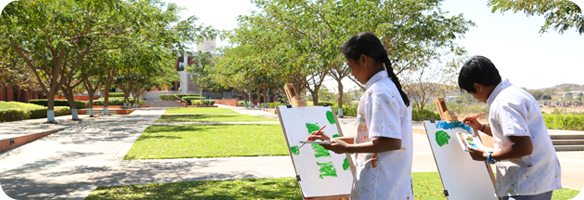
Financial Assistance
Admission to the Academy is competitive and based on student merit, regardless of a family’s ability to pay. The Academy endeavours to meet the demonstrated financial need of each admitted student. Students from all socio-economic backgrounds who satisfy the requirements for entry are encouraged to apply.
Partial to full financial aid is available to accepted students with a demonstrated need. Financial aid awards are reviewed annually and renewed only after reassessment of financial need.
The financial aid form can be downloaded from the Application Forms page. This form must be submitted to the Academy as part of the application package in order to be considered for a bursary.
For further information about admission, scholarships and financial aid please contact the admissions office.
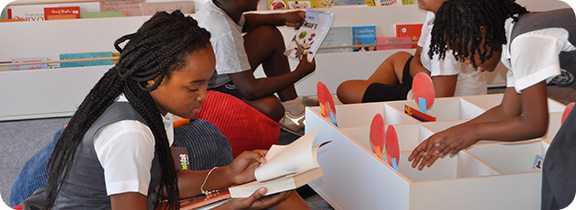
School Uniform
Click here to learn more about the Aga Khan Academy Maputo's school uniform requirements (with pictures/com fotos).
Vendor contact details:
Name of contact: Shaazia Adams
Shop address: 24 de julho nº 724 (between villa das Arabias and Óptica visual-black door entrance)
Phone number: +258 84 969 6962
Email address: customerservice.shaazia@gmail.com
Opened from: Monday to Friday, 8:00 am to 5:00 pm and Saturday, 8:00 am to 1:00 pm
For more information, please get in touch with the Academy's reception desk: (+258) 853 016 339.
Shaivya Arya: Striving for animal rights
Animal welfare organisation Blue Cross of Hyderabad provides ceaseless support to animals in the city by improving their living conditions, and changing people’s mindset about animal rights. Academy students volunteer regularly at the Blue Cross as part of their CAS activities. Student volunteers walk and groom dogs, assist the shelter’s administration staff and run introductory sessions for new volunteers. Shaivya’s activities were centered around the dogs of the blind and disabled ward. She learnt about dealing with cases of dog bites and interpreting dog behaviour. During her time at the shelter, Shaivya also attended a session by Blue Cross of Hyderabad co-founder, Amala Akkineni.
In her time as volunteer, Shaivya found herself in situations beyond her ken but felt pleasantly rewarded when she worked through them. “Gradually, I learnt how to handle unfamiliar situations without anyone's assistance,” she says. “The work experience serves as a method to identify our strengths and weaknesses.” Shaivya says that working at the Blue Cross has improved her communication, organization and time management skills.
Shaivya is passionate about animal rights advocacy. Before her stint at Blue Cross, she conducted surveys for her personal project, ‘Ethical Treatment Toward Animals,’ to better gauge the issue of animal abuse. “What we do not realise is that activities such as visiting the circus, the zoo or even purchasing a certain product can contribute to animal abuse,” she said. Shaivya went on to lead a successful fundraiser for the Blue Cross at the Academy’s parent teacher meeting in January 2018, raising ₹34,000. The money went toward vaccination programs for strays in the city.
Shaivya’s group members at Blue Cross constantly supported her. She credits them with helping her through tough situations and reflects on how they grew together. According to her, the team’s diversity directly impacted the work they did at the shelter. Dogs would run away from baths or refuse to be groomed and Shaivya notes that that could have been frustrating if it wasn’t for her friends alongside her.
“Each one of us has the power to make a change,” says Shaivya. “To save an innocent creature’s life, to help animals. It is time we make this a better world for us, for them, for all.”
Rudra Potluri - dreaming up the future
Rudra has grown into himself since joining the Academy in 2013, most notably through the enrichment programme through which he discovered robotics and design. His work with robots stems from his enthusiasm for engineering, but Rudra has gone beyond just tinkering. “When I was learning robotics as part of enrichment, I never imagined that I would become captain of a robotics team,” said Rudra. Rudra captained a robotics team in January 2018 at the FIRST Lego League competition in Bengaluru. This was the first ever robotics competition that Academy students entered in.
“It didn’t stop there,” he continues, “the Academy provided a platform for me and my team to share our learning and knowledge with the community by letting us conduct a workshop for government schools.” Rudra was part of a team that hosted 48 grade six students for a day, teaching them about robotics and design. “The most unique thing about the Academy is that it doesn’t just stop at teaching, it makes sure that students apply their knowledge in the real world and give something back to society.” Rudra also participated in the Chinna Shodha Yatra, travelling around rural Andhra Pradesh to understand nuances of life in local communities.
In 2014, India's ambitious Mars Orbitor Mission came to fruition and Rudra had the opportunity to take part in a live telecast discussion about the mission on state TV. The following year, Rudra was selected as a Microsoft student ambassador and got to attend a workshop at the Microsoft headquarters in New Delhi. In grade 10, he used his MYP personal project as a chance to explore his interests in engineering and software and built a home automation system. "My aim was to make it for my grandparents, who are older and can’t move around as easily anymore,” he says about the Smarthome Automation System. His SAS, at ₹2,000 per room, is a cost effective alternative to existing systems in the market, which can cost upwards of ₹70,000. In the same year, Rudra showed initiative in his design project, choosing to build a quadcopter. The drone was created to support the Academy's existing security system.
In May 2018, outside robotics events, Rudra also headed the IT and design unit of the Academy’s first ever TEDx. It comes as no surprise then to know that Rudra is considering studying computer engineering after school. Rudra has applied to the Michigan Institute of Technology (MIT) in the USA, and the University of Waterloo, Canada.
Rudra earned a fellowship to spend the 2018 summer vacation in Ryerson University, Toronto, to take part in the Ryerson DMZ Sandbox Basecamp, a workshop for socially conscious young innovators. The urban university is a renowned research institution and we are positive Rudra's contribution will be significant and impactful.
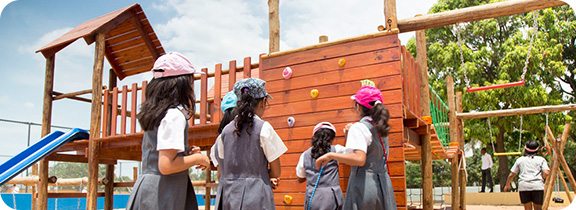
Our Campus
Our Campus
The site was kindly donated by the Mozambican government to house the third in a network integrated Academies, which offer the highest international standard of education to students in countries across East Africa and South Asia.
The Academy’s campus is purpose-built to provide world-class facilities for students and staff. The Junior School, Early Years Centre, Senior School, Science Building and two residential buildings are now complete, and the construction of the Academy and Commons buildings is well underway.
The campus provides an ideal learning environment that includes:
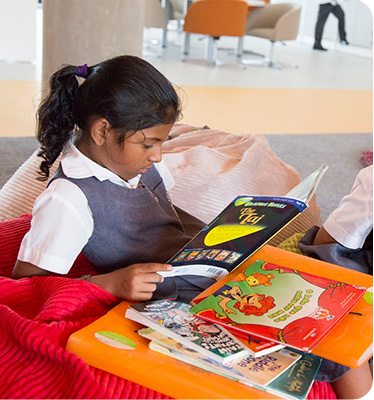 • Classrooms equipped with state-of-the-art technology to enhance collaboration, creativity, and inquiry learning
• Classrooms equipped with state-of-the-art technology to enhance collaboration, creativity, and inquiry learning
• Well-equipped libraries
• Extensive sports facilities
• Spaces for arts, music and performance
Ham Serunjogi: Blazing a path across three continents
Look below for a video of Ham talking about his experience at the Academy.
Swimming from Uganda
Ham Serunjogi, age 23, grew up in Uganda and started swimming competitively at age 6. His parents encouraged his academics and his athletics, and Ham excelled in both. In 2010 he enrolled at the Aga Khan Academy in Mombasa, Kenya.
On his way to Kenya, he competed in the Youth Olympics in Singapore in 2010. At AKA Mombasa, he trained and studied hard, learning leadership and teamwork. He became president of the AKA Student Representative Council. At the Academy he became fascinated by digital communication. In 2011 he conducted a school project back home in Uganda, where he interviewed the IT manager at Cineplex Uganda.
To America
Ham’s drive got the attention of educators. After graduating from the Aga Khan Academy he received a scholarship to study in the United States. He pursued a bachelor’s degree at Grinnell College, where he majored in Economics.
With a fellow Grinnell student, Ham developed an app that allowed users to send short, encrypted voice recordings that would self-destruct after they were played. It was a smart solution that anticipated the rise of privacy concerns in technology. The app could work in places where voicemail systems weren’t common, like Ghana, where his app partner grew up.
The habits cultivated at AKA continued to bear fruit, he says. “The education I gained at the Academy had an emphasis on critical thinking,” Ham explains. That critical ability for problem solving fueled his achievement at Grinnell, along with a conviction that he had something to contribute.
Taking New Ideas to Facebook in Europe
As he prepared to graduate from Grinnell, Ham let himself dream big. He set his sights on the biggest social media giant he could find. “I took an unorthodox approach,” Ham said of his strategy for getting a job. “Instead of applying online, I sent an email directly to Sheryl Sandberg.”
He received responses to his email within hours, urging him to apply online. Soon recruiters were calling to set up interviews. The interviews led to an internship on Facebook’s Global Accounts Team in New York during the summer of 2015, before his final year of study at Grinnell College. There he enjoyed a surprising degree of autonomy to tackle issues that he cared about. In his first weekly one-on-one with his supervisor, she asked him, “What are you most passionate about?” He took that as encouragement and created a new initiative.
Ham is amazed by where life has taken him.
Keeping up Connections and Giving Back
Again and again, Ham has drawn on his experiences from AKA Mombasa, and the bonds among his Academy friends remain strong. Before starting his new job in Ireland, he visited friends and family in Uganda. He still connects often with his AKA Mombasa roommate, Aleem Mawji, now a student at the University of British Columbia. Ham’s friend from the AKA swim team, fellow Ugandan Joshua Tibatemwa, followed his path as a AKA swim team star and student president. Joshua also followed Ham’s example to Grinnell, where he’s now a student. Joshua competed for Uganda at the Rio Olympics last summer.
Ham took time away from settling into Dublin life to watch the Olympics on television, hoping to catch a glimpse of his friend.
Ham has launched into a life of active engagement, creating networks that make people’s lives better. He has seen how such networks make a difference. He shows dedication to paying it forward.
This spotlight is republished courtesy of AKF USA.
Muskaan Bhaidani (Class of 2020): Journey to university and the Academy's impact
Muskaan Bhaidani is an alumna of the Aga Khan Academy Mombasa who was in the Class of 2020. Graduating with an impressive International Baccalaureate (IB) Diploma Programme (DP) score of 44 out of 45, Muskaan is now attending McGill University in Montreal, Canada.
Read on to see what Muskaan says about university life and how her time at the Academy contributed to who she is today.
Can you please tell us about yourself, Muskaan?
I did the IB DP from 2018 to 2020 and took economics, geography and English at higher levels and mathematics, biology and French at standard levels. At the time, I took these subjects purely out of interest, and I really enjoyed what I did. However, I’ve always wanted to work in the development sector, so I think geography and economics played into that really well. I also did my extended essay in French since I wanted to improve in it, but now that I am studying in Quebec, it’s been really helpful.
How did you manage to narrow down your interests to zone in on a career path finally?
That’s such a big question to answer! Honestly, I still don’t think I know for sure what I want to do. I think that the path that I’ve chosen to take is just to keep going ahead with doing what I like, which right now is international development with a focus on food insecurity. In fact, I did my personal project at the Academy around food insecurity, and passion has definitely stuck with me over the years. I’ve also taken an interest in social entrepreneurship, which I could potentially see myself pursuing in the future. Right now, however, I’ll be going with the flow and figuring things out one step at a time.
How did you find the university application process? What did you find challenging, and how did you choose between all the universities you got into?
The university process is definitely difficult and scary because of the uncertainty it entails. I applied to the US, UK and Canada. I personally felt that applying to Canada was a much easier process since you don’t have to send in any standardised test scores or personal statements. Their supplementary requirements, if any, are very minimal compared to the UK and the US. And since a lot of Academies students end up coming here, it’s nice to know that you have an established system to fall back on if you need to. I think the main reason I got accepted to the universities I applied to was because of my academic performance and extracurricular activities that I took part in at the Academy which have carried me to university. As for how I decided on McGill in the end, it was mainly a lot of research and making pros and cons lists. I tried to compare universities in terms of the course I’ll be studying, what I want to do in the future, opportunities I would get while still studying, acceptance rate, etc., and McGill stood out to me in all these aspects. Montreal is a great city for students, and I am glad it worked out!
What have you done since you joined university that you are most passionate about?
I have been a part of multiple clubs. One, in particular, is IYAD (IRSAM Youth Advisory Delegation), a youth advisory delegation to the United Nations, where we write policies and present them at the UN Headquarters in New York every year, and it’s been something I’m really passionate about as I used to participate a lot in Model UN. I am now an executive in the club! I also took part in Enactus, a social entrepreneurship club where we mainly try to help local businesses thrive, and it has been a rewarding experience. Lastly, I am also a member of the varsity artistic swimming team – I used to do a lot of swimming at the Academy till COVID-19 happened, and this was the perfect way to get back into it in an artistic form I had never done before!
How has university life been? And how have you been preparing yourself for this upcoming exchange programme you are participating in?
Life at McGill differs a lot from person to person, but it mainly consists of class in the morning, followed by any extracurriculars you may have taken up. I also have a student job as a student advisor, so I have that in my routine as well, besides swimming and clubs. Going into your third or fourth year in university also means you have to cook for yourself and run your own household of sorts – this actually makes up a substantial portion of a student's schedule. I don't find it to be incredibly different from the high school experience, it’s just more diverse in terms of what you study within your specified subject. I will be going on an exchange to UCL in London next semester. Of course, I’m nervous, but I’m looking forward to immersing myself in a new culture since I’ll only be there for three months. I do consider Montreal home now that I’ve lived here for three years, and going away from home is daunting. I hope it feels as welcoming as Montreal. But from what I understand, London is very diverse, with lots of things to do, and I know I need to put myself out there and be open-minded.
How has the Academy helped shape you and prepare you for university?
The Academy has taught me how to put myself out there confidently by never limiting me and assuring me that I can do anything I set my heart to. It has a way of boosting your self-esteem and shows you your strengths and uniqueness. I engaged in a lot of communal activities and opportunities at the Academy, so I don’t find it difficult to do the same at university, whether that’s applying for a challenging course, position or an exchange programme.
How important do you think it is for students to reach out to Academies alumni?
I think it’s very important. We all leave school and make great friends at university, but the friends you make at the Academy are just different because it is so easy to spend time with them for hours and feel surrounded by a sense of community and warmth. In fact, my roommate now at McGill is a good friend of mine from the Academy. It is easier to reach out on an established Academies-centric network if and when you need help, especially because all of us who have been through the application process are always willing to help whenever we can. Having an alumni community only makes it more accessible and convenient to reach out.
Do you have any advice for students going through the university application process right now?
Work on your predicted grades, those are very important. Build good relationships with your teachers and they can direct you on how to constantly get better at your subjects. And, this might sound cliché, but be authentic in your applications. You never know what a university wants in its essays, and in a pool of incredibly smart and talented applicants, the only way to truly stand out is to be your unique self. So, focus on what you are interested in as opposed to what you think others might find interesting.
Interview conducted by DP2 student Samhitha Paruchuri from the Aga Khan Academy Hyderabad.
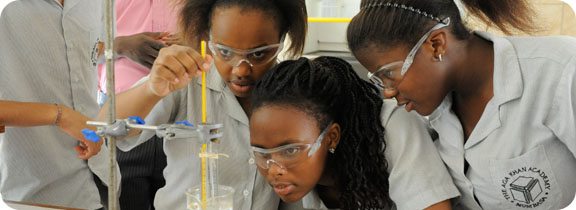
International Baccalaureate
The Aga Khan Academy Mombasa follows the principles of the International Baccalaureate (IB) and is an authorised IB World School.
The International Baccalaureate is a non-profit educational foundation, motivated by its mission to create a better world through education.
The three IB programmes offered at the Academy help develop the intellectual, personal, emotional and social skills to live, learn and work in a rapidly globalising world.
The three programmes are:
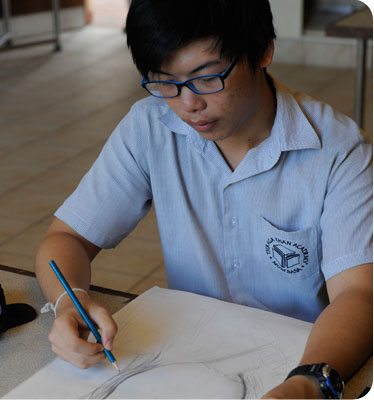
Primary Years Programme
The Primary Years Programme (PYP) at the Academy, for students aged 6–10, focuses on the development of the whole child, addressing social, physical, emotional, and cultural needs, while giving students a strong foundation in all of the major areas of knowledge. Through the PYP, children become aware of and sensitive to the points of view of people in other parts of the world.
Middle Years Programme
The Middle Years Programme (MYP), for students aged 11–16, integrates the study of all the major disciplines, including languages, sciences, literature and the social sciences, mathematics, arts, technology and physical education. The MYP normally includes a service component designed to encourage students to become involved with their communities.
Diploma Programme
The Diploma Programme (DP), for students aged 16–19, is a two-year course of study that prepares students for university. All DP students study languages, a social science, an experimental science, mathematics and, usually, an arts subject.
At the same time as it provides a form of academic passport, the DP generally fulfils the requirements of a student's national education system. Each student's performance is evaluated by independent examiners and measured by his or her levels of knowledge and skills relative to set standards applied to all schools.
Aims of the IB programme
Founded in 1968, the International Baccalureate currently works with 3,423 schools in 141 countries to develop and offer their programmes to over one million students.
Their mission statement declares: "The International Baccalaureate aims to develop inquiring, knowledgeable and caring young people who help to create a better and more peaceful world through intercultural understanding and respect."
"To this end the organisation works with schools, governments and international organisations to develop challenging programmes of international education and rigorous assessment. These programmes encourage students across the world to become active, compassionate and lifelong learners who understand that other people, with their differences, can also be right."
The IB is more than its educational programmes and certificates. At heart they are motivated by a mission to create a better world through education.
They value their hard-earned reputation for quality, for high standards and for pedagogical leadership.
They achieve their goals by working with partners and by actively involving stakeholders, particularly teachers.
For further information please visit the IB website.
